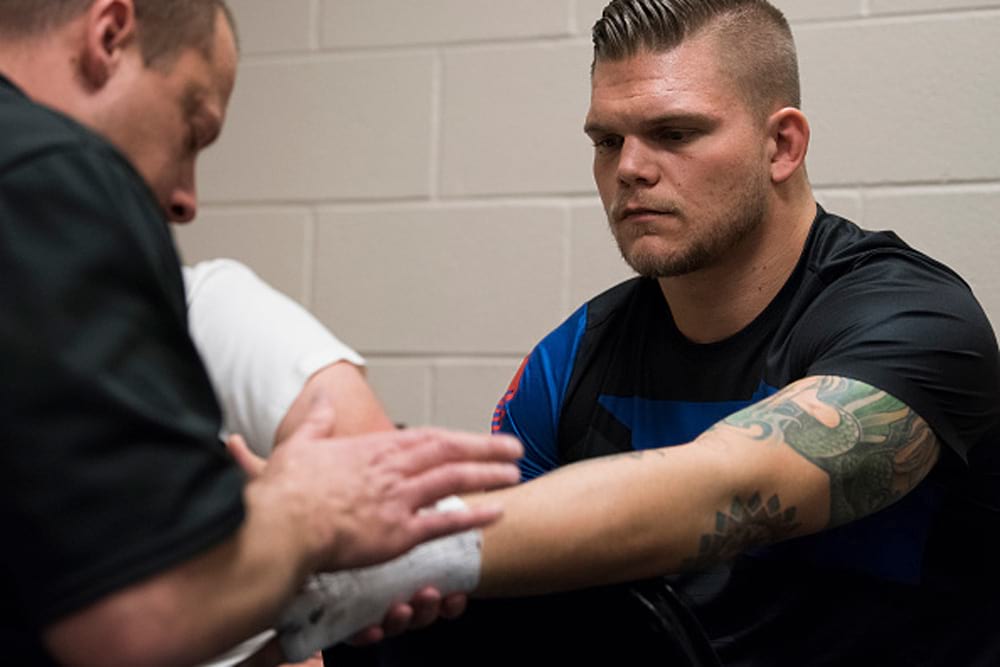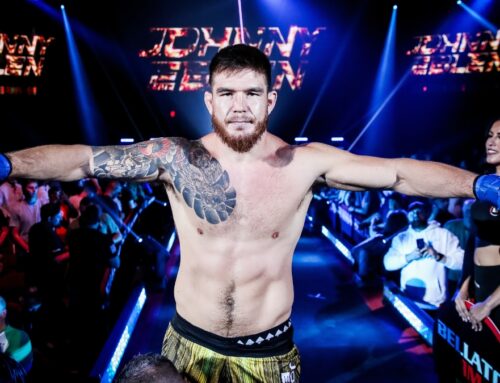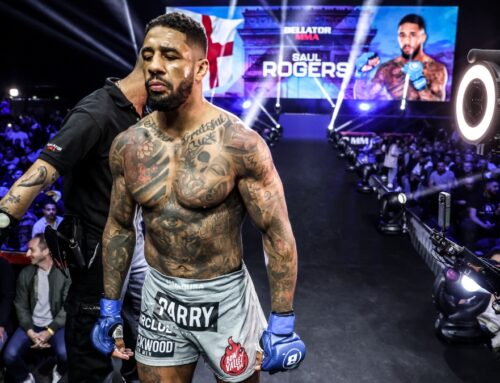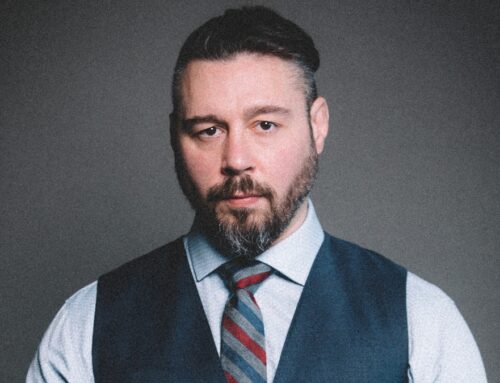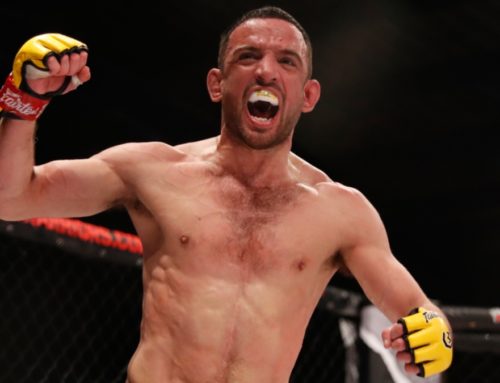Chase Sherman was at a pool party the first time he aimed his fist at the chin of another human being and watched their lights go out. Not yet ‘The Vanilla Gorilla’, he was just 16, which would explain why the sight of his rival going limp upon receiving this punch, an act that would later come to represent victory and success, led only to concern in the teenager’s mind. He had wanted to hurt the boy. He had wanted to make him pay for running his mouth. But not like this. “Oh, s**t,” is all he said at the time. Now, 11 years later, he remembers it as one of the scariest moments of his life.
It stayed with him. The punch, the image, the feeling it generated. Knockouts will do that. Knockouts change things. They shift momentum. They scramble senses. They settle fights. Chase Sherman’s first, unofficially registered at the tender age of 16, terrified him, while his last, at UFC 211 in May, allowed the 27-year-old to feel financially secure and was, therefore, a cause for celebration.
This change in the interpretation of a knockout punch speaks to how Chase Sherman’s life turned out. At first, he was never interested in fighting, at least not professionally. He was instead eyeing a career in football or baseball. Before that, he was just being a kid. “An average kid,” he says. He was being a kid on his bike, being a kid who wrestled with his younger brother, being a kid who liked to fish. He was being a kid while he had the chance to be a kid because he saw what it meant to be an average adult from D’Iberville, Mississippi.
“I didn’t just want to be average,” he says. “You see that a lot, especially around here. People get in that lull of being in Mississippi. We’re like the worst statistically in every category. We’re supposed to be the poorest and the least educated state. Everybody thinks we’re kind of backwards.
“People around here work on the oil rigs off the Gulf of Mexico or work at the shipyard, but I didn’t want to do that. I felt there was a greater purpose for me. I used to think that was going to be football, but I didn’t have the physique, especially in the position I played, to make it to the NFL.”
It was while playing football at D’Iberville high school that Sherman began to gravitate towards the vocation that would come to define him. Fist-fighting, Sherman learned, could happen anytime, anywhere. On a Friday, on a Sunday; on the field, off the field. Ingrained in a culture, Chase walked the surrounding areas of D’Iberville, a city with a population of less than ten thousand, with both fists clenched. “You grow up hearing how great football players would always get in fights at the weekend – it’s tradition,” he says.
Most of the time it was Sherman who did the knocking out. Once, however, when assigned the task of breaking up a fight involving a friend, the fledgling knockout artist came to realize fisticuffs was a two-way street.
“They wanted me to break it up because he was going against some bigger guys, but I didn’t want to,’” he recalls. “I was looking around and I swear they had been to Home Depot and got these perfectly cut wooden posts. I thought, man, I might get hit by one of those.
“Well, I went to break it up and someone came up to me with one of those posts. I grabbed their hand and stopped them, but someone else came running up behind me and blasted me to the back of my head. That was the first time I’d ever been almost knocked out. I was walking like a giraffe after that. I was so wobbly. I turned back around and all hell broke loose. Now everybody was going at it.”
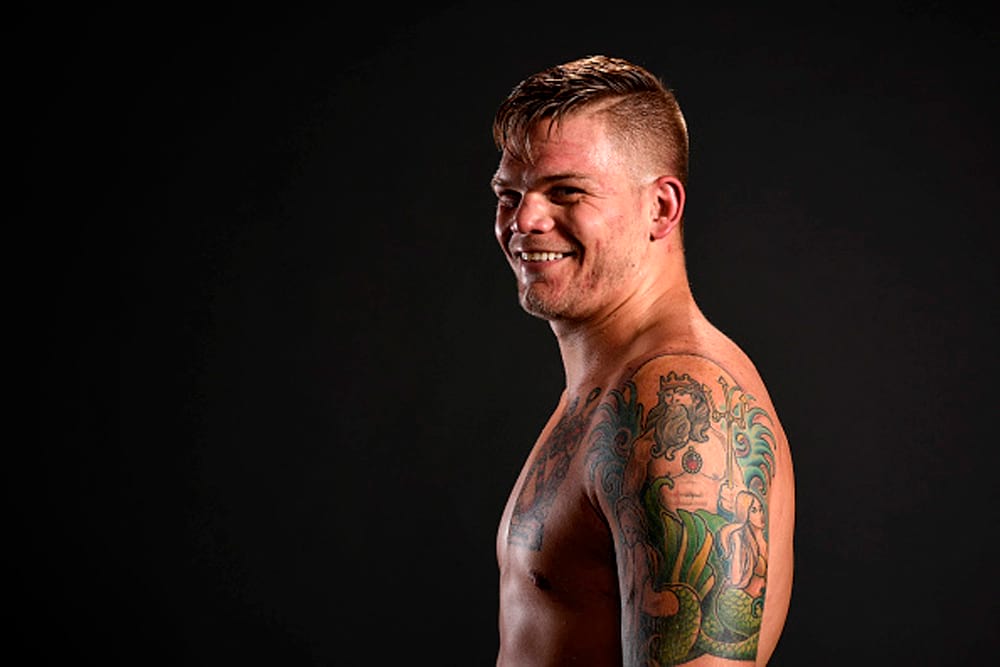
He categorizes this period in his life within the chapter “Young and Dumb” and somehow makes the idea of getting whacked around the head by a wooden post sound like a rite of passage. Perhaps, for a rambunctious teenager destined to make a living from fighting, it was.
“It definitely helped with the striking,” he admits. “I would watch it on TV and think, man, I can do that, but obviously, I didn’t know s**t.
“When I got done playing college football at Delta State University, I spent time with a couple of friends who were doing MMA. I thought, hell, I can give this a try.
“We would train and spar, just the three of us, in this little shed on this guy’s property. We’d do pads, flip tires. We’d go out there every afternoon and pretty much beat the s**t out of each other.”
Sherman was just 22 when he had his first amateur fight and was told en route – by an inquisitive friend – that the opponent with a 2-3 record he was set to face was, in fact, a regional champion in Louisiana yet to lose in five fights. A southpaw, too.
“At that point, I had no idea what I was getting into, so I was kind of ignorant to it,” he says. “I wasn’t really nervous until I got properly punched in the face. We touched gloves and the first punch he threw, a straight left, landed. I was like, oh s**t, this is the real deal. But I grabbed the guy and started kneeing him until I finished the fight.”
Sherman was far from a fully-formed fighter. He was still learning, still putting the pieces together, still summoning the courage to tell his parents what he was up to. What’s more, it was only when on the cusp of making his professional debut, in January 2014, that he realized a key chunk of the puzzle was missing.
“I was sitting around with my buddy and was like, ‘Man, I’m about to go and do this and I don’t even have a fight nickname.’”
The left-field answer he received that day – ‘The Vanilla Gorilla’ – would change everything.
“That was the first thing he said,” Sherman continues. “He just said it nonchalantly like he’d been thinking about it for months. I was like, ‘Man, that is great!’ It’s funny. It’s not super-serious. I didn’t want to be a douchebag with a douchebag fight name. It’s a super marketable nickname. It’s a good one.
“Also, it works because I’m a heavyweight. If I was a lightweight, I wouldn’t call myself ‘The Vanilla Gorilla’. That would be weird.”
The fun stuff for any fighting neophyte can be found in the selecting of a nickname and the early knockout wins against overmatched opponents unqualified to clean the cage floor, much less offer resistance or threat. But then the real stuff happens. Reality bites. A defeat comes along.
For Sherman, he of five consecutive first-round knockouts, this happened the night he was stopped inside a round by Alex Nicholson in pro bout number six.
“Man, that was really tough,” he says. “I got the takedown, I’m working the ground-and-pound, he’s locking my arms up and I’m like, man, this is f**king boring. So I let him get back up. My coaches were telling me to stay on top of him, but I was like, no, I’m going to try and finish this in the first round.
“He came across with a spinning back-fist and caught me clean. He dropped me. I was never unconscious, though.”
Undeterred, Sherman kept improving, won four fights via first-round knockout, and marched into the UFC in 2016. On his way to becoming something more than average, it was then that another couple of defeats, first to Justin Ledet and then to Walt Harris, threatened to introduce him to the dreaded Mississippi lull.
“I lost the first fight and was struggling financially because all I did was fight on the local circuit and go to college,” he says. “I didn’t have any money. It was Christmas time and I couldn’t buy anybody any gifts. It was really tough.
“I then suffered my first loss in the UFC when my girlfriend was pregnant. Financially, I was struggling, and the day I got home my dog died. I then lost to Walt Harris and got home to find out my girlfriend wanted to leave me. We’d just had a son and now I had to pack my things, get out the house and find a place to live.
“But I feel like God puts you in those positions to make you gritty and tougher. I was like, OK, f**k this losing s**t, I’m tired of it.”
More than a choice, winning became a necessity ahead of Sherman’s fight with Rashad Coulter in May. It was his third in the UFC; historically, it’s three strikes (losses) and you’re out. Moreover, with approximately a hundred bucks in his bank account, Sherman needed victory for reasons above and beyond competition and climbing rankings.
He got it, too. The win, that is. He stopped Coulter in the second round of a thriller, for which he received a well-deserved ‘Fight of the Night’ bonus check of $50,000.
“It was enormous,” he says. “It let the world know I wasn’t just some bum the UFC messed up and signed. It put me in a great situation to get some things going and get my life on the right track. It allowed me to be somewhat financially stable for the first time.”
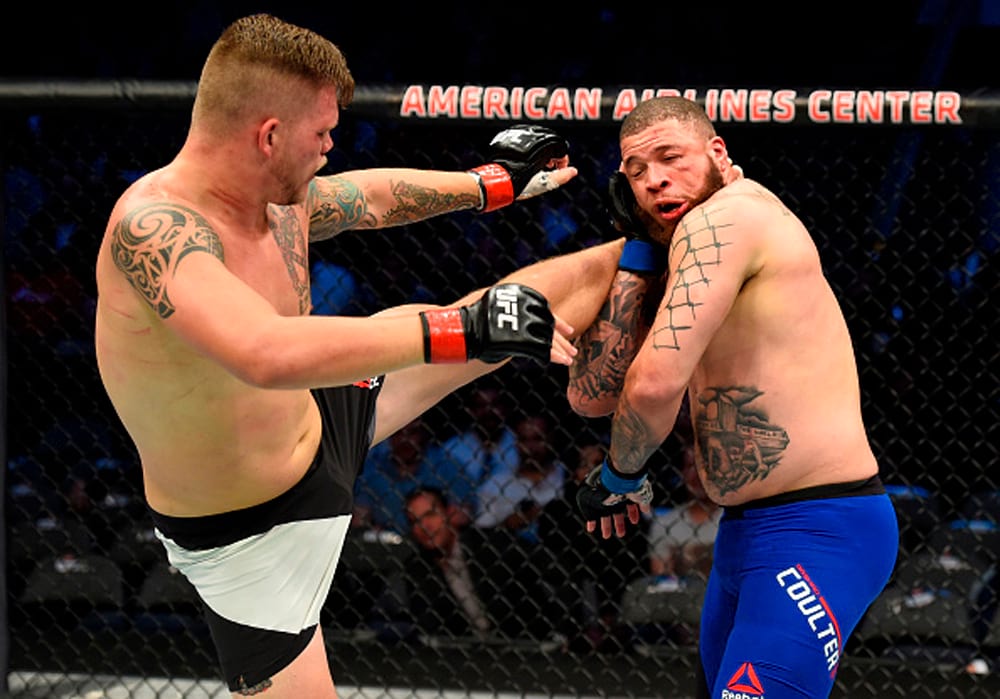
Sherman, 11-3, has since won another – beating Ryan Grabowski by decision in July – and enjoyed the fruits of momentum. He’s winning fights, validating all the great work he has been doing at the Jackson-Wink gym in Albuquerque, and also, thanks to his handiwork, unique nickname and underdog story, creating quite the buzz online.
“It’s huge, man,” Sherman says of social media. “It’s huge in terms of endorsements, building a brand and letting fans know who you are. But it’s also huge because the guys at the top of the UFC love to see it, too. The more popular a certain fighter is, the better it is for them. They tend to take care of you if you self-promote. The more active I am on social media, the more I think the guys at the UFC will be saying, ‘Okay, let’s get Chase the fight he needs. Let’s make sure it’s an opponent who is going to be good for him.’ They’re not just going to throw me in there with anybody. They’re going to try and build you up and market you.”
The goal, according to Sherman, is to win a UFC heavyweight title by the age of 30.
“I think that would be massive,” he says. “In Mississippi, we don’t have a lot going on in sports and it’s always important for me to represent the Gulf Coast. I want to make them proud and let people know a small area like ours can produce champion fighters.
“We’re fighting people down here. We don’t have much. We have to go out there and fight for it. If you look at the great athletes who have come out of Mississippi, they’re at the top because they had to work that much harder to get where they wanted to get. You look at (NFL stars) Jerry Rice, Walter Payton and Brett Favre. Even actors like Morgan Freeman and Oprah Winfrey. They were all from Mississippi. None of them had it easy.”
Vanilla he might be. But Chase Sherman is far from Mississippi average.
*** This feature first appeared in the November 2017 issue of Fighters Only magazine ***

